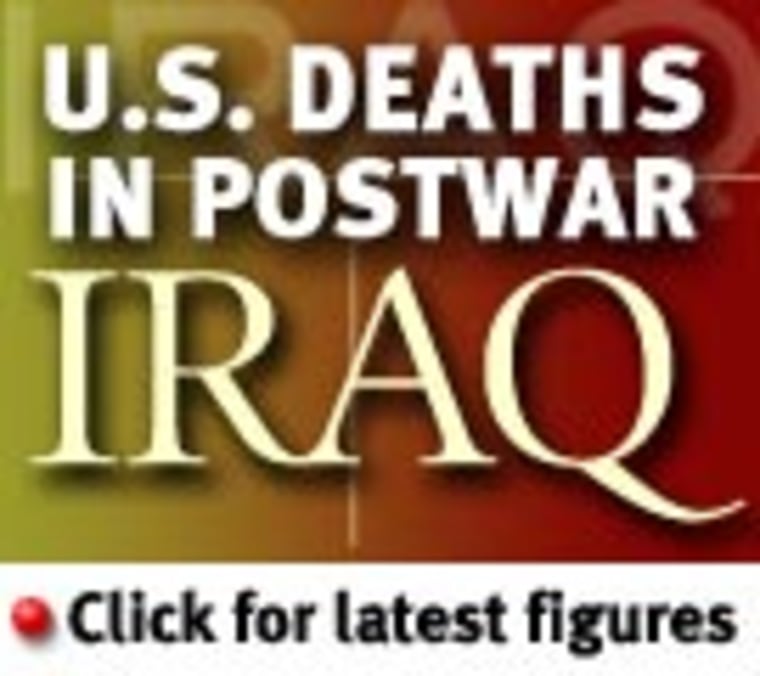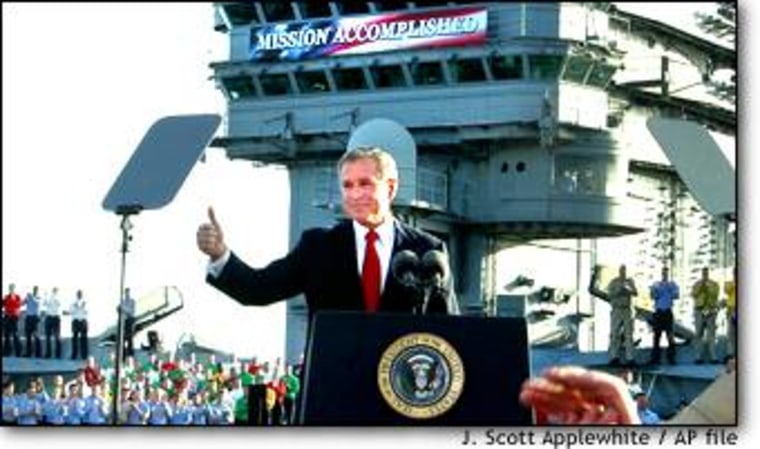It’s a conversation heard more and more around the halls of Harvard Business School these days: One of President George W. Bush’s unique qualifications for office was his Harvard MBA. Yet the mess in postwar Iraq has revealed a lack of the careful planning that Harvard teaches its elite clientele.

AND A RELATED PROBLEM — the ballooning federal budget deficit — hints at much less financial discipline than B-school alums are supposed to have. “Because George is a graduate of the school, there’s lots of casual discussion about what he learned, or didn’t learn, while he was here,” says David Yoffie, a Harvard Business School professor of international business administration.
Granted, leading a country is a bit more demanding than managing the Huggies diapers brand or running a BusinessWeek 50 company — the sort of jobs Harvard MBAs typically hold. That goes double for trying to simultaneously manage an effort as unpredictable as invading, then rebuilding, another country.
“FUMBLING AROUND”
Still, much has been made of Bush’s status as the first MBA president, with a degree from a school that placed No. 3 in BusinessWeek’s latest B-school rankings and that’s one of the top five schools in the world in teaching both management and finance.
So, the President’s performance thus far raises some fair questions: Where was Bush’s MBA training when he planned — or seemingly, failed to plan — the post-conquest management of Iraq? And now that his Administration’s lack of foresight has been amply illustrated, what’s the best way, according to B-school dogma, for Bush to successfully recover?
Certainly, postwar Iraq could be a Harvard case study of crisis management gone wrong. Five months after the president proclaimed the U.S. invasion a victory and declared a cessation of hostilities, basic services such as electricity and water remain subpar, public safety in Iraq is lacking [especially for friends of the U.S.], deposed dictator Saddam Hussein remains on the loose — and the continued loss of American soldiers, including 16 killed in one attack on Nov. 1, threatens to turn U.S. public opinion against the Bush Administration and its war.
Most often, the President blames “terrorists” for the U.S. military’s inability to control the situation. Yet professor emeritus Howard Raiffa, who taught at Harvard Business School and Harvard’s Kennedy School in the 1970s, offers a different theory. “I see a lot of fumbling around,” he says, which leads him to conclude that the Bush team’s own postwar “actions have fostered this reaction” by an Iraqi rear guard. Raiffa adds that he’s “anti-Bush, so I come with that prejudice.”
MISSING BRANCHES
It requires no prejudice, however, to spot the contrast between the disorganization in postwar Iraq and the precision of the invasion itself — or the principles that Harvard taught MBAs during Bush’s 1973-75 stay and still holds today. Basic strategy courses continue to train students in the use of “decision trees to assess the probability of outcomes, and how each decision could branch into other decisions,” says Yoffie. “If there’s a lesson from Iraq,” he adds, “it’s to think thoughtfully about alternative situations, as in a multi-move game. You have to think of the implications for the fourth, fifth, and sixth moves...and of contingencies if the plan doesn’t go as expected.”

No one but the president and his aides know for sure if he used this approach. But if he did, say B-school Brahmans, his decision tree seems to be missing some branches. The White House and Pentagon have said they gave requisite attention to warnings from the State Department and the CIA that the post-conquest cleanup could be difficult.
Yet, “the only thing I’ve heard floated as a Plan B was to declare victory and leave it up to the Iraqis to figure out,” says Edward Snyder, dean of the University of Chicago’s Graduate School of Business. “I don’t think that most strategy professors would say that’s a Plan B.” Observes Laura D’Andrea Tyson, dean of the London Business School and former national economic adviser to President Bill Clinton: “They didn’t even have a scenario for if things went well.”
“COMPARISONS ARE POSITIVE”
Some Bush classmates see such criticism as too harsh, among them Richard Payne, 55, executive vice-president of National City (NCC) in Cleveland. “What [Bush] has done in Iraq is textbook decision making,” Payne believes. The president is looking at unfiltered data from the front lines, “which is what we were taught to do,” Payne adds. “He’s asking, what does the data say about schools being open, police being trained, and the electricity being on? How does that compare to 30 days earlier, 90 days earlier, and to before Saddam was taken out? The comparisons are positive.” All of them, perhaps, except for the numbers that record the rising toll of U.S. dead.
Sooner rather than later, those will shine a light on the President’s style of “leadership” — a word B-schools increasingly use to distinguish today’s style of management from the old, top-down variety. On the positive side, from a B-school perspective, Bush “initially had a clear focus and did a lot of delegating,” notes Tyson. “That characterized his leadership style.”
Yet in the view of Tyson and others, the president’s leadership skills fell short as he mounted what some experts in international relations have called an elective war. Great leadership, adds Tyson, “is to understand and explain to people, in a complete and realistic way, what the trade-offs are.” In retrospect, perhaps no one in the Bush Administration did an adequate job of that.
NO “WIN-WIN”
The troubling possibility, some B-school profs suggest, is that the president and his advisers didn’t lay out the trade-offs because they didn’t grasp the full range of potential problems. Certainly, in his last address to the nation before the invasion and in his speech on the deck of the aircraft carrier USS Abraham Lincoln soon after the war, Bush displayed no inkling of what has come to pass.
“The most important thing for the guy at the top is intuition,” says Elon Kohlberg, a professor at Harvard’s B-school. Had Bush’s been keener, B-school experts say, he might have dealt with America’s invasion-averse allies in a less cocksure manner. “The first thing we teach in a negotiations class is to look for win-win...try to find ways where everyone comes out ahead,” says Justin Wolfers, a professor of political economy at Stanford Graduate School of Business. In Bush’s pre-war dealings with the U.N., “there was no evidence of creative negotiation,” Wolfers adds.
Harvard’s Raiffa sees a pattern there. The first instance, he says, was Bush’s decision to reverse a previous U.S. position and back away from the anti-global-warming Kyoto Protocol in April, 2001, even though more than 100 other nations eventually ratified it. “We summarily, and one-sidedly, decided to keep what we wanted and discard what we didn’t,” recalls Raiffa.
TIME FOR TEAMWORK
He argues that the Administration’s negotiating skills reached a low point at the U.N. last spring, just before the U.S. invaded Iraq. “We were disdainful of the United Nations,” Raiffa recalls. “And yet at this point, we find that we have to go crawling to them to get their help. That should have been thought about earlier.”
“We’re interdependent,” Raiffa notes, adding that were Bush back at Harvard for a refresher course he would “impress upon him the need for collaborative decision making and not going it alone” as the reconstruction of Iraq proceeds. That may become inevitable if the postwar crisis drags on, he argues. “We’re going to come out of this one way or another,” he predicts, “probably through negotiation with our European allies.”
Whatever path the president chooses, he should realize that when things go wrong it’s often time to try a new approach, adds Barry Nalebuff, professor of economics at the Yale School of Management. Nalebuff adds that one source of Bush’s difficulties is “an inability to change his strategy in light of differing circumstances.”
ABSENT THAT DAY?
In response to a call seeking comment about the lessons Bush was taught as a B-school student, Harvard sent an e-mail statement: “Although courses and content in the curriculum change continuously over time,” it reads, “the HBS learning model, which is based on analyzing some 500 case studies in which teams of students work together to address the uncertainty and complexity of real-world problems, remains constant and leaves a lasting mark on the thought processes of every student.... The school’s focus is on general managers who can see the big strategic picture, establish priorities, and make the most of the functional expertise of those who work with them to make decisions and take action.”
When it comes to Bush’s handling of postwar Iraq, it seems, either Harvard didn’t deliver on its goal — or the future President didn’t pay close enough attention.
Copyright 2003 The McGraw-Hill Companies Inc. All rights reserved.